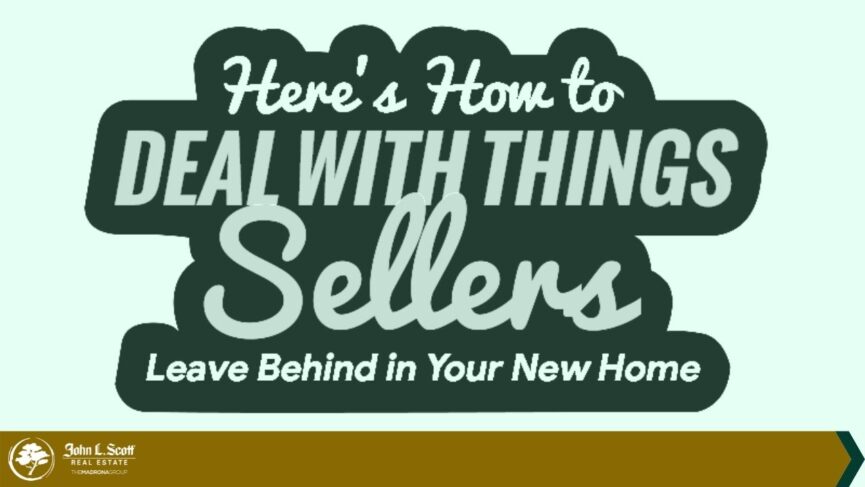Once you’ve closed the deal and got the keys to your new home, the next exciting part is bringing your belongings with you so you can finally settle in. But rather than finding your new place in a spic and span state and enjoying the fresh start, your left wondering what to do if the seller leaves things behind.
Unless the items have been part of the home purchasing negotiations, the general rule is that sellers are expected to take all of their belongings with them when they move out. But while it isn’t uncommon for previous homeowners to have forgotten a few items behind when they move, some leave with a house full of junk, which can be a nightmare to deal with.

Staring at the sellers’ abandoned clutter surely isn’t what you thought you should be doing on your first night at your new place. You probably already have plenty of questions in mind:
Are you allowed to get rid of those piles of junk?
What could you have done to avoid getting this mess in the first place?
Dealing with this issue certainly isn’t enjoyable. However, there are steps you can take and even options to choose from when you find yourself in such a situation.
Here is How to Avoid It:

The best way to handle the problem of what if a seller leaves things behind? Think ahead and prevent it from happening in the first place.
Unfortunately, there’s not a standard provision in the purchase agreement that deals with the scenario where sellers leave items in the house after closing.
This is addressed in Form 22D in the NWMLS line 3 and 4.
3: Seller Cleaning. Seller shall clean the interiors of any structures and remove all trash, debris and rubbish from the property prior to buyer taking possession.
4: Personal Property. Unless otherwise agreed, seller shall remove all personal property from the property not later than the possession date. Any personal property remaining on the property thereafter shall become the property of the buyer, and may be retained or disposed of as buyer determines.
You could even allocate an agreed upon amount of money that will be deducted from the sale to cover the cost of removing all the abandoned items. You may also consider a penalty provision under which the seller could owe you monetary damages if all their belongings are not removed in time.
However, you have to anticipate that you may need to delay the closing or moving date, and/or file a small claims case for breach of contract if this occurs (which will be discussed further).

By completing a thorough walkthrough with your agent before becoming the new owner, you can ensure that the house is empty and move-in ready. Apart from checking that everything is in working order, you can also check to make sure that the sellers have removed all of their personal belongings.
Open all kitchen cabinets and drawers; even the bathroom vanity, closets, and all other storage spaces. It’s even recommended to take photos of anything that’s not supposed to be there, so your agent can present them at closing.
More often than not, the sellers are just as anxious as you are so they may have forgotten the items they were storing. A final walkthrough is your chance to make sure that the seller has upheld their part of the agreement. If not, there’s still time to let them know that the house needs to be completely cleared out before the moving date.
What to do if the previous homeowners left their belongings:
If you’re already faced with the issue of having your house full of the previous owner’s junk, there are still a few ways you can handle the problem.

As the official owner of the home, the abandoned items are now yours to deal with as you wish. There’s no need for you to contact the seller if you decide to throw them away. But if you want to resolve the issue amicably with the seller, you could reach out and let them know that their items are still on the property.
Sellers who may have accidentally left their items, particularly those high-value ones, might agree to pick up their belongings. However, be wary of vague promises or “I’ll get those next week” arrangements, especially from owners who intentionally left their debris.
If they didn’t show up after waiting for them to follow through, it’s a good idea to take photos of the items, get an estimate for the removal, and send them to the seller to pay.

If you have issues with the previous owners not picking their belongings up or refusing to pay to have their things removed, you may now go the legal route. Consult with your attorney about state- and town-specific guidance regarding such issues. You may seek reimbursement for the cost of the junk at a small claims court based on a breach of contract.
Remember that these cases can take months and that there are no guarantees.

Packing and moving your belongings is already stressful enough. It’s completely understandable if you don’t want to sort through someone else’s possessions and would prefer to have everything hauled away.
But if you’re motivated to make the most of what the previous owner left behind, you could keep or donate the useful items. Since buying and moving included some expensive upfront costs, maybe you could benefit from the free yet still functional furniture, home decor, or even kitchenware.
You could also donate items like old clothing to local charity shops or organizations. Whether you choose to donate, sell, discard, or keep these items— it’s already up to you.

Unfortunately, if the previous homeowners only left things that are practically worthless, irreparably damaged, or broken, you might not find anything worth keeping or donating. Your best choice is to hire a junk removal company specializing in hauling away trash, furniture, and other unwanted clutter. By getting rid of the unwanted things, you finally free up space in your new home so that you can start unpacking and settling in.
Share this post!




